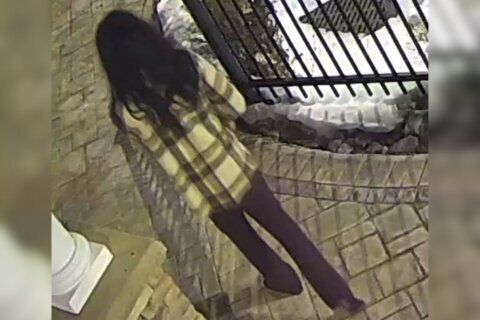Lawmakers in Montgomery County, Maryland, are outlining the next steps in a body-camera transparency bill sparked by the treatment of a 5-year-old boy who was briefly handcuffed and berated by county police officers last year.
Members of the public are set to weigh in Tuesday afternoon on a bill requiring the police department to regularly review body-camera footage and automatically turn over some footage to the county executive and members of the Montgomery County Council.
Montgomery County Council President Tom Hucker, who represents District 5, introduced the bill in May, following the public release of camera footage showing what he called “horrible abuse” of the 5-year-old boy who had walked away from East Silver Spring Elementary School.
The encounter — in which the crying boy was cuffed and one of the officers said, “I hope your mama lets me beat you” — happened in January 2020. Footage of the incident was not seen outside of the department — even by members of the county council — until this March, after the boy’s mother filed a lawsuit against the school system and the county.
“The incident revealed a lack of transparency and oversight of our body-worn camera footage,” Hucker said during an online briefing with reporters Monday.
He added, “After finding out about the incident and seeing the video 14 months after the fact, my colleagues and I have been working to make sure that never happens again.”
Hucker said the department has a “very good body-worn camera program” that captures thousands of hours of police interactions with the public. But there’s no requirement for body camera footage being reviewed by the department’s internal affairs division to be shared with the police chief or elected officials.
Hucker’s bill would require video footage connected to internal affairs investigations involving the use of force, interactions with children, and potential discrimination or harassment by police to be automatically turned over to the police chief, the county executive, members of the county council and the state’s attorney.
In addition to automatically turning over footage, Hucker said he believes the department can use better technology to review footage.
“I’m not completely confident that we’re using all the functionality,” Hucker said.
The body-worn cameras the department uses are made by a company called Axon.
“There’s a lot more that I have heard … that we could be doing to use artificial intelligence to sort through those videos more expeditiously and bring incidents that are of concern” moving forward, Hucker added.
The public hearing on the measure is set for 1:30 p.m. Tuesday. Following that, the public safety committee is set to hold a work session, which is tentatively scheduled for July 22.
Help for renters
Separately Monday, Hucker and Council Vice President Gabe Albornoz continued to urge residents to sign up for rental assistance programs as the state prepares later this summer to lift a moratorium on evictions during the coronavirus pandemic.
Albornoz, an at-large council member, said the Department of Health and Human Services is continuing to process applications for rental assistance. So far, the county has received 6,683 applications and paid out $2.29 million in payments. There are a total of 2,230 active applications.
“Each of the calls coming in requesting rental assistance is taking several hours to work its way through, because — in addition to trying to assist residents with their rental challenges — we are trying to connect them to other services,” including workforce development, behavioral health and other resources,” Albornoz said.
The aim is to “serve as a navigator to address the core issues that are leading to families seeking rental assistance in the first place and also helping them access other resources and funds that may be available to them so that they can more holistically address their needs,” he added.
Last week, Maryland Gov. Larry Hogan announced the coronavirus-related state of emergency would officially end July 1 and — after a 45-day grace period — so would a statewide eviction moratorium.
Albornoz said officials in the county anticipate more tenants will begin to receive notifications from their landlords about unpaid rent following the governor’s announcement.
Albornoz said residents can call 311 if they receive information from their landlords about owed back rent or an eviction. The county is working with Legal Aid to help residents understand their rights.
If, however, residents receive a legal summons, they should always respond and go to court, since failure to appear means an automatic judgment against the tenant, even if they have a good case.








